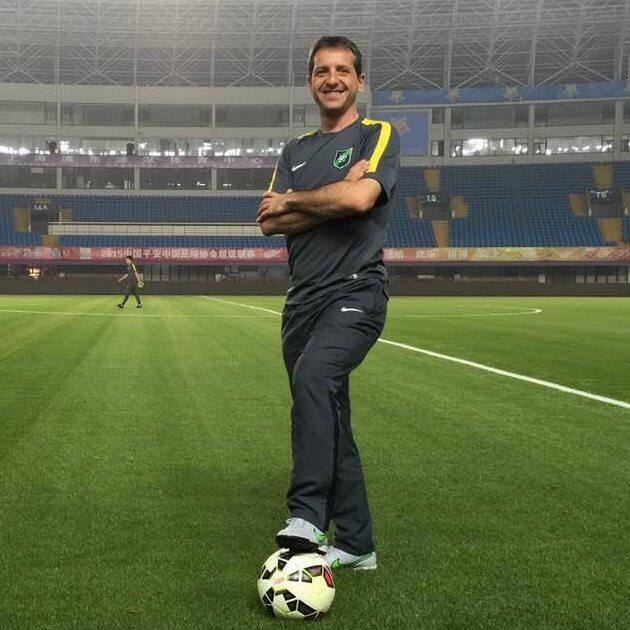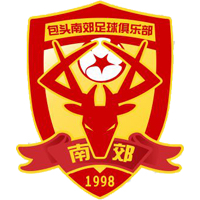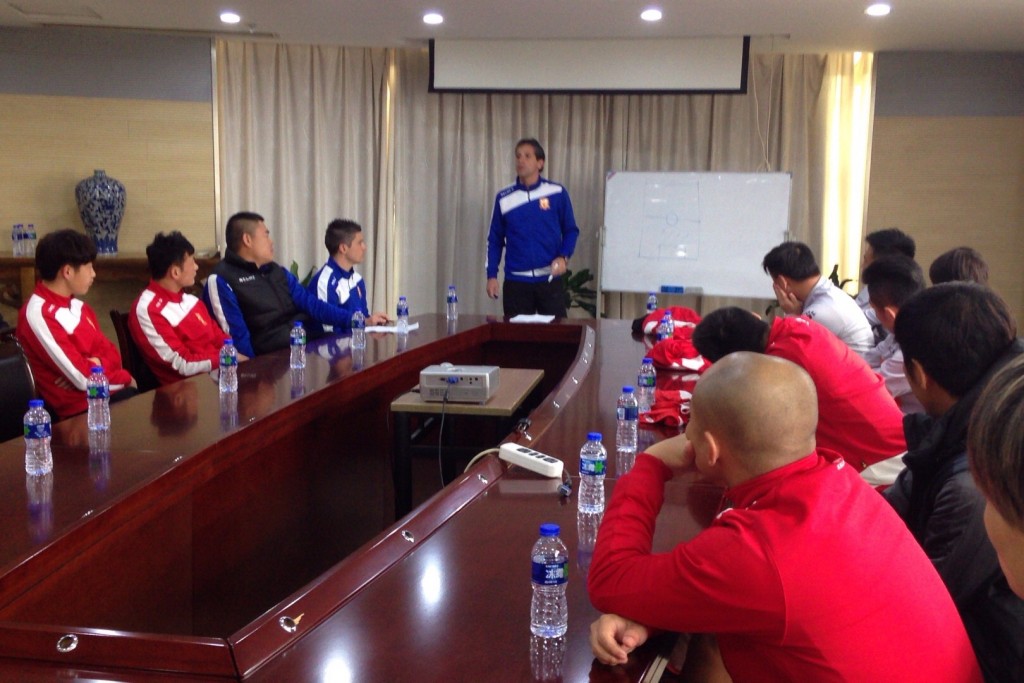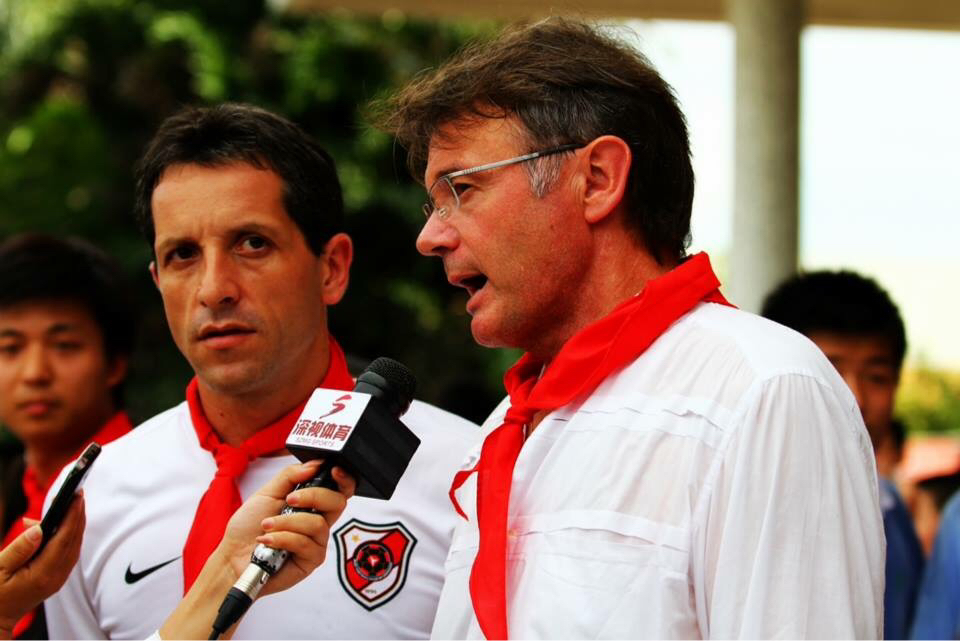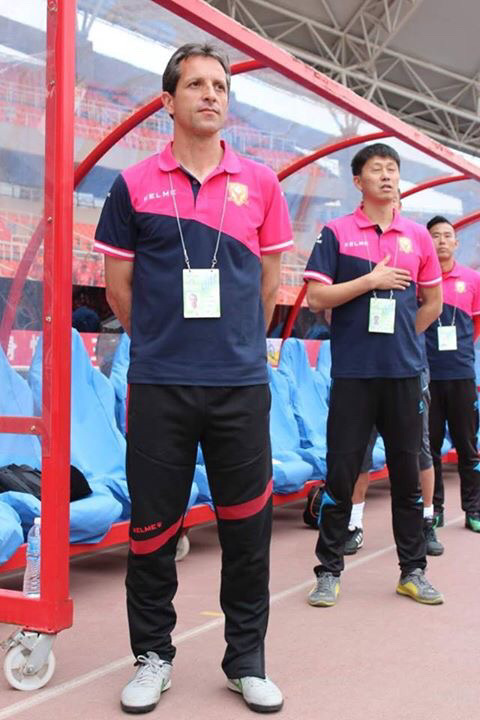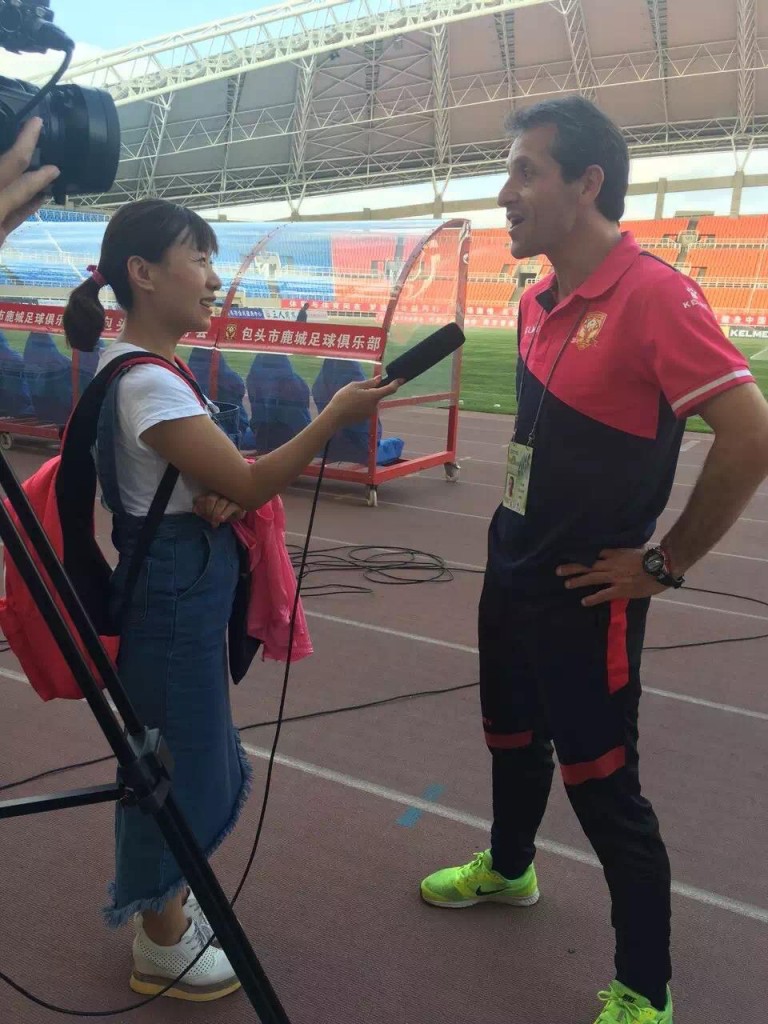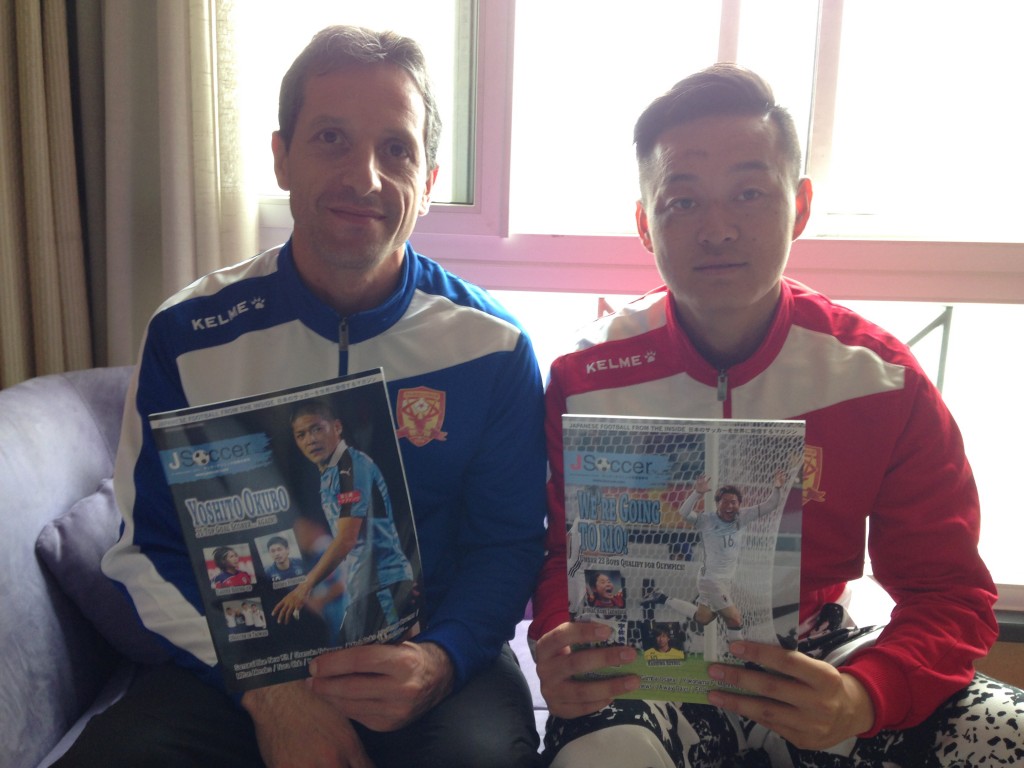JSoccer Speaks with David Camhi
Recently, in China, Lionel Piguet had the chance, on behalf of JSoccer Magazine to meet David Camhi, a passionate French coach who, for four years worked under Philippe Troussier, at Shenzhen Ruby, CS Sfaxien in Tunisia, and then back in China at Hangzhou Greentown.
In between these episodes, he also found time to be assistant coach of Taiwan's national team before eventually becoming a head coach himself at Baotou Nanjiao FC, a team in the Chinese 3rd tier. The team are supported by an ever-increasing number of fans and who are aiming at the first division within four years under their new tactician.
The club is located in the city of Baotou, which is in the northern part of China, in Inner Mongolia. Until this year the club was allowed to admit only 5,000 people into the stadium - which has a capacity of more than 40,000 – but that restriction was lifted for this season, which is great news for the prosperity of the club.
JSoccer: Hello David, thank you for your time, and let me go straight in… can you tell us if Chinese clubs are run by companies, like Japan’s teams were originally?
David Camhi: I don’t know so much about the history of Chinese football. On the other hand, I know the organisation of their football today. There are two kinds of management here. There are clubs labeled "municipal", where the municipality will fund a club for two or three years and then, one day, will decide not to continue and the team will move to another municipality that has decided to fund them. For example, there was a club in Beijing who went to Xian, then to Guizhou, and has now returned to Beijing - all of that happening between 2011 and 2016. That club is Renhe, where Xavier Chen played (Taiwan’s vice captain). But that WAS the state of Chinese football. Now, we see changes, with the arrival of the likes of Guangzhou Evergrande and Shanghai SIPG - clubs that have been bought and financed by large companies – or clubs owned by investors who buy clubs and manage them, like the Paris St. Germain/Manchester City “model”. Also, since 2016, clubs no longer have the right to move their “franchise”. So now there is a bit of everything: municipalities funding teams, as well as money coming in from large corporations, and then some private companies with less money but involvement in clubs.
JS: Who oversees your club, Baotou Nanjiao FC?
DC: It is managed by Mr. Yao, but I know that the municipality plays a role too, as well as many people who support the club. The municipality let the club use the stadium and gave us synthetic fields which belong to the club now.
JS: Do you coach Chinese players the same way you would coach Europeans?
DC: It's impossible to coach Chinese the same way we coach Europeans. There's a cultural aspect that comes into account. The biggest problem I encountered with (Philippe) Troussier was that the Chinese do not "live football" as we Europeans do (and Troussier told me that he had the same problem in Japan). In China, the players do not see the training session as a preparation for the match which means they will not automatically see the relationship between a training exercise and a match. When I want to get something from them, I can not rely on the spirit of individual initiative within the proposed exercise. It's the carrot and stick with them, and this has obvious cultural roots.
JS: You coached the Taiwanese national team, was it the same with the Taiwanese?
DC: The Chinese are much more into the football. Chinese footballers are professional footballers. Taiwanese always hesitate between playing football and doing something else (Editor's note - we heard this in our previous interviews with Taiwanese players at Fujieda MYFC Ladies!). Chinese players will be harder to motivate during training sessions then the Taiwanese, who will invest more because they have made a choice to play football. But some Taiwanese players will even choose not to come to training at all, because they have other things to do that day! I really enjoyed working with the Taiwanese because those who were there knew why, meanwhile the Chinese are there because it's their job and not their passion.
JS: You have coached foreigners here in China, how was it with them? Do they adapt easily?
DC: I will answer you frankly, I saw everything. What we see in China is that the Chinese market is very volatile for foreign players. Often a foreign player signs for several years, but he will leave six months later. So a foreigner in China is usually coming for the money, and leaves after a while. There are some players, like Darko Matic, a Serbian at Beijing Guoan, who played here for seven years (2009-2015), who learned Chinese and settled very well. I have worked with Babacar Gueye in Shenzen who moved with his wife and son there, and now he has two other children and is very happy. Then there is Takeshi Rakuyama, who played for Shenzhen for three years from 2011 to 2013 and retired, started his own football academy in Shenzhen and is still there. Many are mercenaries, though, who come for the money and, in other cases, even if a player wants to stay, clubs will sell them because there is the "business" aspect behind it.
JS: Could you give us a few names of some of the best Chinese players who you feel might have the ability to play in Europe?
DC: Shanghai SIPG's Wu Lei, who is a "number 10" of sorts is a great player. Guangzhou Evergrande's right back, Zhang Linpeng, who has reportedly been watched by Chelsea and Real Madrid, is also not bad! Often, though, the mentality is the problem, some players could play in Europe but one problem is that the Chinese are not killers... they don't have the rage to fight on the pitch. Another problem is that they earn good money in China. Why would a player go overseas when they can earn three times what they would do there? An MLS club contacted me to bring a Chinese player over for 2017, because, apparently they have a Chinese investor in the club, but the Chinese player in question didn't want to go because he would be paid less and because he would have to work more. Chinese would also be lost in Japan, they would be in a competitive environment which is not the case in China. I think they are too respectful toward foreign players. And that's why the national team is suffering, because when they are no foreigners to do the job for them on the ground, and they find themselves all alone with just Chinese players around them, there's nobody to take charge on the field. Whoever you put in charge of the team, it will not change the problem.
JS: How did the fans react to the latest big transfers?
DC: They are excited for two reasons, the first being that they are happy to see good players like Tim Cahill, Demba Ba, Gervinho or Lavezzi coming over because Chinese fans also support the players as much as they support their club. Didier Drogba and Nicolas Anelka were big events in China (Editor's note - what about Marlon Harewood?!). The second reason is very Chinese. When a club is investing a lot of money in a player, it's because they want to pay more than the rival club to show they are richer. So a Chinese supporter will boast, "My club spent 50 million Euros on a player, the club is financially good." This is what happened with Demba Ba, who had agreed to come for about 3 million Euros to Shanghai SIPG but then Shanghai Shenhua came and doubled the amount all because it was "a Shanghai derby" and they wanted to prove to their fans that they had money.
JS: Is there a real fan base here in China?
DC: There are many fan clubs and associations but it depends on the region. In some places, like Beijing there are many fans and teams are playing in full stadiums, while in other places like Shenzen there are not many fans in the grounds at all. Before Evergrande was bought, there was little interest in Guangzhou Evergrande. Then, later on, they found themselves with 40,000 fans at every home game.
JS: Are there true "ultras" in China, like in Marseille, for example?
DC: Yes and no. During the games, people will support their team and have a good time. If their team wins, they will be happy and if the team loses, they will be unhappy but will not boo their players. In China social networks are very popular, so when they go on Weibo or other similar forums, they will chat a lot. They say what they think, but comments will not be the same as those you would find in France. The analyses are like, "He is not very good, don't play him", but it stops there. There are far fewer tactical criticisms.
JS: Have you ever seen fans protesting during, or after a match, like we often see in European grounds?
DC: Yes, I have experienced that with Shenzen Ruby. After a defeat, supporters blocked the exit of the stadium, although the protest was not directed at the team. We were losing 2-0 at home, if I remember correctly and after we pulled a goal back, two fans jumped on the athletic track to celebrate the goal and the police reacted violently. In protest, supporters blocked the exit. We waited one hour in the locker room. But it is nothing compared to what we see in Europe. They also make banners here, but they generally don't use aggressive words.
JS: Can you speak freely to the press during interviews?
DC: Coaches have no right to speak about the referees' decisions. In addition, as a foreigner, you have no opinion other than football to give. But no one will think to criticize the Chinese authorities while living in China!
JS: When Sven Goran Erickson says China will win the World Cup in the near future, what should we think of it?
DC: I'm not as optimistic as he is. I would say that China will win the World Cup, but in twenty or thirty years maybe. Understand that Chinese professional football was created in 1994. They have 20 years of history while we (France) have 100 years of history. Anyway, I think the generation that will win the World Cup for China is not yet born.
JS: When do you think they will have a strong enough team to qualify for the World Cup?
DC: That can happen at any time, but then to maintain that... The real question is: when will they have a team that will qualify every four years for the World Cup? They are not there yet.
JS: How can we explain their latest disastrous results in some of the youth categories?
DC: This is because of their pyramid scheme that has no basis. Clubs are not clubs, but teams. They play football at schools and after that, they stop playing. Clubs do not(yet) invest in a youth system. What Evergrande is doing seems the best way. They bring 3000 youngsters into their training centre and then, even if only ten of them can eventually be professionals, they have at least the base of the pyramid to work with.
JS: Can you tell us a little more about your club, Baotou Nanjiao FC, and your goals?
DC: It was an amateur club that turned professional just last year when it was promoted to the 3rd division, since all 3rd division clubs must be professional and pay their players. The club's structures and the way of working are not (yet) so professional, though, so, for me, part of my work - at the request of the President - is to "professionalise" the club first. Results are secondary. The operation of the team is very amateur, the mentality of the players is too. It is neither the worst nor the best team in the third level and we are working to improve all around. Last year Baotou finished sixth out of ten, and the modest goal this year is to do as well as that.
JS: In your team, do you have players who have the talent to reach a higher level?
DC: Yes, my striker Chen Chengye has the strength and the intelligence of a footballer who can play well above this level. He still has some technical flaws, but he has everything to succeed. He was born in 1995 so he is young and has time to progress, but above all he needs to develop a more professional behaviour.
JS: For those outside China - our readers, for example - who want to follow your team, how can they do it?
DC: One can find the results on Chinese sites only. There are two websites that make some publicity for the 3rd division, the first being the official Chinese Football Association website. There is the calendar, results and official news. Then there is another site which is made by fans, where you can find videos, interviews and articles but there will only be new content once every one two weeks.
JS: I saw that your team welcomed you like a king on your arrival, what was that like?
DC: It was nice, but in a way I am used to it. Not because of previous reaction me, but because of Troussier. He was welcomed like that everywhere. So somehow I was used to it but this time it was without Troussier!
JS: If you could choose one player from those you have worked with in the past, who would that be?
DC: It depends, it is difficult to answer because the choices of a coach can be both political and football wise. So, for example, I would be willing take a player like Chen Po-Liang. In Baotou I brought two players who I knew from before and who I know will support me until the end of the season. That's the spirit I need. The first is Wang Xiao. He played under Troussier in Shenzhen in the reserve team. He scored eight goals, but as he had little chance to play with the first team he left for a division 2 team, where he became a central defender. We found him in Hangzhou by chance, and he was still a central defender, and still in the reserve team. Takeshi Okada was his coach. When I took him to Baotou I asked him to come and play as a striker. At first he was reluctant, but finally he agreed. If he scores eight goals this season, I'll be happy. Next we have Adi Parha. I took him from Xinjiang. He had a trial at Shenzhen in 2011 and, at the time, I found him very good but we did not take him. I traced him through friends. He is a great player who stabilises my central defence which is a big plus.
JS: Let's talk a little bit about Philippe Troussier! How did you meet?
DC: I found out one day on a web site that he signed for Shenzhen Ruby FC. I contacted him through a mutual friend to offer my services (without really believing I'd get an answer!) telling him that I was a graduated coach and that I could speak Chinese. Three days later Troussier called me on my cellphone and asked me to come at the beginning as a translator and then as technical coordinator. I became his personal assistant. I was him when he was not there in a way. I had this role for four years, and I learned everything from him. I learned the Troussier's method, which means that I learned to put a barrier between me and my players. I pay attention to the use of my authority, without compromising myself. This means that I will not start solving small problems like a player arriving late for meals, players who have earphones or those kind of nonsense. Keeping this barrier, not to let players break my authority is what Troussier taught me. Because with him I experienced almost everything. I even saw a player during boarding on an airplane running away from the airport. Now anything could happen to me, I would ask myself: What would Troussier do in this situation?
JS: How is Philippe Troussier with his players?
DC: There are two Troussiers! One who is very paternalistic, which means that he loves and is interested in his players' development as "individual footballers." The other, a much more strict Troussier, but one who is always fair. He will often say to a player, "You, I love you, but you're not playing today, or you, I don't love you, but you get to play. Which one do you prefer?" He has that kind of relationship with the players. Somehow he's right. The truth comes only from what is happening on the ground. I try not to be friendly with my players. This barrier is important so as not to owe anything to anyone.
JS: Is it hard to not be friendly with the players?
DC: In a club in a top division, well organized, no, it is very easy to be distant. But in a club like Baotou, I find it hard to do this. I have to be close to the players because they are amateurs and I struggle because many players in my team will never evolve in a higher level. I am forced to make concessions because I lack the staff and the system I want to set up - inspired by Troussier - I struggle to hold on to what I want to do. I often have to take a step back.
JS: What was your best moment with Troussier?
DC: Not the best time but the best moments of each week. After some time together, he liked what I was doing and above all, respected my tactical advice. He put me in charge of the videos, which was basically arranging video editing on our team, on what was good and what was not and, of course, also analysis of our opponent. I would talk with him about the team and he always valued my opinion. We even discussed his pre-game speech. I agreed to do many things for him just because there was this tactical side, this football side. Every week, when we were making the video, I fully enjoying my work. I loved looking at the opponents, making reports for Troussier, and then speaking with him about what he would be seeing. Troussier is very humane with his staff but, beware, he can also be very strict with his players and staff, very demanding
JS: Who could you compare him with?
DC: (Marcelo) Bielsa, (Diego) Simeone or (Jose) Mourinho.
JS: Could you tell us a couple stories about Troussier?
DC: Our Chinese striker arrived at training on Thursday and we were told he was injured and he could not play on Saturday. This angered Troussier. He never blames the players off the field. If a is player injured, the staff has its share of responsibility. So that day Troussier was very harsh his medical department, with arguments that a good doctor should know how to manage his area and must decide wherever a player is fit to play or not. He said that the doctor should have known that the player was capable of playing after an injection or with a good support dressing. So Troussier forced the player to train, which he did, but with little motivation, because he considered himself considered injured. Finally, the player was sent home from training. The day before the match Troussier forced the player to return to the group to prove that he was right, and that the player was fit. The next day, he played, he scored and we won the game. That's Troussier, he always manages to push players above their own level in some way.
I'll tell you another story, something that happened often. We had a translator who was a bit short, and often during the game conference, Troussier would be shoulder to shoulder with him, telling his players to, "Stick the guy, then press him!!!"... and the translator often bounced off Troussier, which made all the players laugh.
JS: Did Troussier often spoke about his time in Japan to you? What would he tell you?
DC: Yes he talked to me a lot about it. He told me that the Japanese were ahead of everyone and that they knew how to develop players and it impressed him. But , also, that they were too nice and too disciplined. He told me that he forced them to cross against the traffic light to teach them to rebel. He wanted to train the players to have more individual responsibilities and as I know Japan too, I totally understand why he made them do it.
JS: Do you have a dream as a coach?
DC: Yes, I would like to use football to travel all over Asia, but not as a tourist. The objective would be to train a national team, or a good club, and win titles.
JS: Do you have any preferred teams in Asia?
DC: Yes of course, not only one. In China, Shenzen because I worked there. I always look for their results. Otherwise there are other teams for whom I have sympathy, but I do not actually support, such as Yanbian Funde. At that team there is a very strong Korean influence, they always play good football and have crazy fans. I am delighted for them because they just got promoted to the Super League. In Thailand, I love a club called Thai Port FC who have an old English style stadium which is often full with 10,000 seats (Editor's note - currently managed by Masahiro Wada, ex-Vissel and Sanga boss). I support OGC Nice and Port's stadium reminds me of the atmosphere of the Stade du Ray. There's a fan base out there that I like. They went down to second tier and that's the kind of challenge I love... getting back to division 1. Then, in Japan, I have some feelings for Urawa Reds simply because I wanted to see a game in Tokyo and when I arrived at the stadium after two hours in the train I heard the atmosphere from well outside the stadium. Unfortunately I couldn't get in because it was sold out!
JS: What do you think of Japanese football?
DC: I think it is the best in Asia. Japan has put down a marker now. They are at a decent level and they will continue to build on that, while in China, after President Xi Jinping is gone and the money he is ploughing into the game dries up, it will fall. They don't yet have the base of the pyramid, while in Japan the pyramid is there.
JS: Are there any Japanese players in particular that you watch?
DC: I follow (Keisuke) Honda and (Shinji) Kagawa. I love Honda, I think he's a very good player.
JS: Would you like to coach in Japan?
DC: Of course, it is a dream to coach in Japan. For me, Japan would be the best place to coach but, right now, I am very happy to be in China. It's great here.
JS: I have heard several times in France people labeling Troussier a mercenary. What do you feel?
DC: Troussier is not a mercenary at all. When he is doing something, it is HIS project, which means he is like a bull in a China shop. It's Troussier's method, and no one else's method, because he believes in it. He thinks long term, and always in the interest of the club or the country that he is leading.
JS: And you, do you also think long term?
DC: No! I would love to travel while enjoying football. But then, obviously, if Baotou Nanjiao FC works out well, I will be staying for several years to get the club to the top tier. I must succeed to make this club a club that inspires respect.
JS: How many years do you think it takes to judge a coach at a club?
DC: I would think about three years, ideally, even four years to win a title. The first year you do with what you have, the second year you build your team and the third year you refine it.
JS: What is your playing philosophy?
DC: My philosophy is the one that will suit the players under me. What I like about football is the number 10, and that's why I like Honda, or those kind of players. I'm lucky to have one in my team, but it's hard to play with a "10" in China because they all play 4-2-3-1 or 4-1-4-1, with many long balls. Now in football there are not so many teams playing with two axial forwards, and if we play with a 10, you have to have two axial attackers to get the best out of him. I also like to have one "number 6", instead of two defensive midfielders. I like a diamond formation in midfield. But here, it is more about my strategic vision of football.
In truth, what interests me in this job is to find the best team possible, which means the best tactic suited to the available group of players, with their qualities and their imperfections.
JS: Right now which formation are you using most?
DC: I play a 4-1-4-1 now, but this is not what I like best. In fact, I do this because, in a friendly match that we lost 4-0, I realised that the players did not know how to defend well, and they were not aggressive enough on the ball. I know that with a 4-1-4-1, with four players in the midfield, we can press on both sides. By comparison, if you play 4-2-3-1 you lack a player higher on the pitch to come back to help out on the sides. I play this way right now more to force my players to defend while going forward than because I like the 4-1-4-1 formation.
JS: Will you change system during the season?
DC: Yes, I want to change. I would like to play with two strikers because I didn't come to this club to finish 6th or 7th. My goal is to perform a miracle. We will play to score goals. I'd rather win 4-0 than 1-0, although I know that playing with two in front does not necessarily guarantee more goals!
JS: The best of fortune to you, and thank you for your time!
Chinese League web site (in Chinese only): http://www.fa.org.cn/zy/
Other useful web site - direct to Chinese Div.2: http://www.endirect24.com/national/China/League-Two/2016/
Hits: 5457

